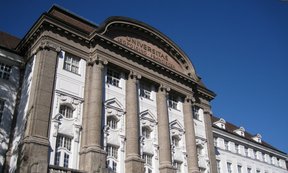"The European Universities Initiative has led to a surge in innovation in the European Education and Research Area in recent years. I am very pleased that we were one of the first Austrian universities to recognise the great potential and that we can now further intensify our successful cooperation in the Aurora Alliance," says Rector Veronika Sexl, delighted with the award from the European Commission and continues: "Efforts to tackle technical, but also global and social problems present education systems around the world with challenges that can only be solved together. The Aurora Alliance offers us a structured framework to work together with European partners on societal solutions and to open up new opportunities and possibilities in terms of comprehensive internationalisation." Members of Aurora European University Alliance are: University of Iceland (Lead, IS), University of Innsbruck (A), VU Amsterdam (NL), University of Duisburg-Essen (D), Université Paris-Est Créteil (F), Università degli Studi di Napoli Federico II (ITA), Universitat Rovira i Virgili Tarragona (ES), Palacky University Olomouc (CZ), Copenhagen Business School (DK); it is led by the University of Iceland in Reykjavik, where the official kick-off of the next Alliance phase will take place in November.
The initiative, which stems from an idea put forward by French President Macron in 2017, aims to deepen cross-border cooperation between universities in line with the European idea and, in particular, to increase the mobility of students, academics and staff. The European Commission is providing a total of 402 million euros as part of the Erasmus+ call for proposals, which has now been completed, and is now funding a total of 50 alliances across Europe.
Digitalisation and sustainability as a focus in Innsbruck
With the establishment of a separate Vice-Rectorate for Digitalisation and Sustainability, the new Rectorate under Veronika Sexl has placed a special focus on two comprehensive areas of the future. The University of Innsbruck is also leading a corresponding work package on the "Green & Digital Campus" within the Aurora Alliance. "As universities, we not only have to address these issues in terms of content, but also develop our structures accordingly," says Vice Rector Irene Häntschel-Erhart, who is responsible for digitalisation and sustainability, describing a key challenge. "If we want to come closer to the European Commission's goal of enabling 50% of our students to have an international learning experience during their studies, we need to explore new digital paths that are also resilient in terms of sustainability." The activities of the Aurora Alliance are being implemented along a total of five thematic hubs, which are orientated towards the Sustainable Development Goals (SDGs) and develop new joint teaching activities and scientific networking activities. In the next phase of the Aurora Alliance, for example, a 30 ECTS credit programme on "Sustainability & Climate Change" led by the University of Innsbruck will be further expanded, which will draw on the expertise of all Alliance partners and can be completed by students from Aurora universities.
Securing long-term anchoring and funding
With the extension of the financial support from the European Commission, basic funding for the initiative has been secured for the coming years, as Thomas Baumgartner, Head of the Aurora Office at the University of Innsbruck, explains: "In terms of perspective, it has already been announced that a low-threshold extension for a further two years has been secured following this follow-up funding. Beyond this structural funding, however, all alliances must consider how they can anchor the cooperation in the university structures in the long term and support the various strands of action in terms of content." This can be achieved through additional projects from European funding programmes, for example: The Aurora Alliance has already been very successful here in recent years with over 25 cooperatively acquired H2020 projects totalling more than 20 million euros. However, national support measures are also relevant here - such as those provided by the OeAD in recent years - and must be secured in the long term.

